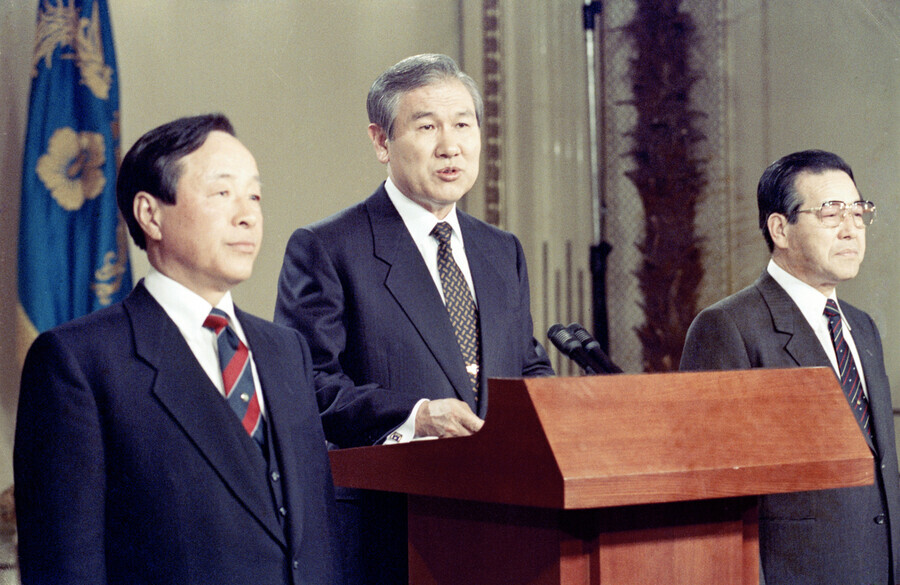hankyoreh
Links to other country sites 다른 나라 사이트 링크
[Editorial] Roh Tae-woo leaves legacy of disgrace without apology

Roh Tae-woo, former president of South Korea, passed away of a chronic illness on Tuesday, Oct. 26. While he made substantial contributions during his presidency in relations with North Korea and with socialist governments through Nordpolitik, we cannot wholeheartedly honor his memory because of the immense crimes that he committed during Chun Doo-hwan’s dictatorial rule, including the massacre of civilian protesters in Gwangju in 1980 and the 1979 coup that brought Chun to power in the first place. Other blots on Roh’s record are his lackluster attempt to reckon with the abuses of the Fifth Republic (that is, Chun’s presidency) and to his appropriation of public funds in a massive slush fund.
During his presidency, of course, Roh broadened our horizons in relations with North Korea and the socialist bloc as the Cold War wound down around the world, and that was an undeniable accomplishment. Without his bold decisions, South Korea may not have been able to establish diplomatic relationships with the Soviet Union, China, or other members of the socialist bloc, reach a basic agreement with North Korea in 1991, or join the UN at the same time as the North — all of which followed Roh’s statement about national autonomy, unification, and prosperity on July 7, 1988.
Roh should also be commended for seeking to stabilize the livelihood of the working class and to expand the middle class by introducing the public concept of land ownership and by greatly increasing the housing supply. His personal touch — which was more accommodating than his predecessor Chun, though both came from a military background — is thought to have helped move Korean society away from authoritarianism and pave the way for a civilian government.
Roh’s behavior following his pardon also sharply differed from Chun’s. Roh kept a low profile in an apparent exercise of self-restraint. That cut quite a contrast with Chun, who refused to pay his court-ordered fine and has a penchant for making insulting remarks whenever it seems the public has forgotten him. In 2013, Roh finished paying the fine he’d been given by the court.
But the credit Roh has received for such acts cannot conceal the dark shadow he cast over Korea’s contemporary history. Most damningly, he never personally apologized either to the people of Gwangju or the Korean public as a whole for the Gwangju massacre in May 1980, despite his heavy responsibility as a leading figure in Chun’s junta. When Roh addressed the Gwangju Democratization Movement in his memoirs, published in 2011, he even said that “the cause of the incident was Gwangju citizens getting blinded by rumors.” Roh’s son, Jae-heon, has apologized to the victims and bereaved families of the massacre on several visits to Gwangju since 2019, but proxy apologies don’t merit complete forgiveness.
There appear to be calls from some politicians and sectors of Korean society to honor Roe with a state funeral and burial in a national cemetery because of his achievements while in office and given the need for public unity. But such calls must not be heeded.
Surely Chun has made clear that neither reconciliation nor forgiveness are possible without complete remorse and a genuine apology. At this time, it is sufficient to quietly mourn the death of Roh Tae-woo, the citizen.
Please direct questions or comments to [english@hani.co.kr]

Editorial・opinion
![[Guest essay] The real reason Korea’s new right wants to dub Rhee a founding father [Guest essay] The real reason Korea’s new right wants to dub Rhee a founding father](https://flexible.img.hani.co.kr/flexible/normal/500/300/imgdb/original/2024/0423/8317138574257878.jpg) [Guest essay] The real reason Korea’s new right wants to dub Rhee a founding father
[Guest essay] The real reason Korea’s new right wants to dub Rhee a founding father![[Column] ‘Choson’: Is it time we start referring to N. Korea in its own terms? [Column] ‘Choson’: Is it time we start referring to N. Korea in its own terms?](https://flexible.img.hani.co.kr/flexible/normal/500/300/imgdb/original/2024/0423/3617138579390322.jpg) [Column] ‘Choson’: Is it time we start referring to N. Korea in its own terms?
[Column] ‘Choson’: Is it time we start referring to N. Korea in its own terms?- [Editorial] Japan’s rewriting of history with Korea has gone too far
- [Column] The president’s questionable capacity for dialogue
- [Column] Are chaebol firms just pizza pies for families to divvy up as they please?
- [Column] Has Korea, too, crossed the Rubicon on China?
- [Correspondent’s column] In Japan’s alliance with US, echoes of its past alliances with UK
- [Editorial] Does Yoon think the Korean public is wrong?
- [Editorial] As it bolsters its alliance with US, Japan must be accountable for past
- [Guest essay] Amending the Constitution is Yoon’s key to leaving office in public’s good graces
Most viewed articles
- 1[Column] ‘Choson’: Is it time we start referring to N. Korea in its own terms?
- 2Senior doctors cut hours, prepare to resign as government refuses to scrap medical reform plan
- 3[Guest essay] The real reason Korea’s new right wants to dub Rhee a founding father
- 4Why Korea shouldn’t welcome Japan’s newly beefed up defense cooperation with US
- 5[Column] The clock is ticking for Korea’s first lady
- 6Opposition calls Yoon’s chief of staff appointment a ‘slap in the face’
- 7New AI-based translation tools make their way into everyday life in Korea
- 8Terry Anderson, AP reporter who informed world of massacre in Gwangju, dies at 76
- 9Korean government’s compromise plan for medical reform swiftly rejected by doctors
- 10[Editorial] Japan’s rewriting of history with Korea has gone too far